
First day of a new job rarely is easy. First day of a job on a commercial fishing boat in southwest Alaska is soul-scorching.
“I can handle cleaning,” Jawanza Brown said. “I can handle heavy lifting. I can handle the hard work — you constantly get slapped in the face by a fish because it’s still alive and wants to swim away. But in the nitty gritty — I don’t know what it is — when I have to bleed a fish and put it (in the refrigerated saltwater hold) 2,000 times day, then the slime builds up and eventually, you slip, and you’re on your knees.
“Then let’s go out and do it again tomorrow . . . you just feel like, why am I out here? Why am I out here on my hands and knees?”
That first day for Brown was more than four years ago. He no longer asks the question.
He’s good with the answer.
Every June, the young Black man leaves his Flint MI., home to keep his bargain with an old white boat captain from Bellingham: Six weeks of what Brown calls “pretty crude work” in exchange for the income to pay for four years of college and a chance to have a piece of the world.
That’s the answer to the question Brown asked of himself on his first day.

Now he teaches the newbies how to answer the question too.
Besides Brown and the man behind the enterprise, boat owner Buck Gibbons, this season’s four-man crew included returnee Paul Pacini, 32, from Bellingham, and newcomer David Braman, 22, from Mercer Island.
“Jedi mind tricks,” Brown said, laughing about how he counsels himself and others about the relentless, 12-hour work days. “I feel like I taught (new crew members) pretty well, in my role as a kind of a leader after a few years under my belt. It really boosted my own self-confidence. I did enjoy the fact that when something happened, I knew what to do, versus just standing around waiting for somebody else to respond.
“But that first step is always like, ‘Whoa, man, this is the dragon!”
Brown and Gibbons were brought together through the backstory of a former Seahawks running back neither have met, but both admired.
Thomas Rawls is from Flint, where he was a prep football sensation, and went on to play at Michigan and Central Michigan. He once spoke to a sports assembly attended by footballer Brown, and came to the Seahawks as an undrafted free agent.
For a time in 2015, Rawls looked liked a close successor to injured Marshawn Lynch. He ran for 100 yards three games in a row, including becoming the first player in NFL history to have 250-plus scrimmage yards, a rushing touchdown and a receiving touchdown in the same game.
Gibbons is a Washington State University grad, a sports fan and a 30-year-plus veteran of the mammoth Bristol Bay sockeye salmon fishery — this year’s fleet harvest at season’s end on July 31 was 39.2 million fish, fifth-most in the history recorded by Alaska Fish and Game. He has given a generation of young men the same deal as Brown’s: Four summers of hard outdoor work at a good-paying job in exchange for the promise to spend the wages on college tuition. He calls it fishin’ for tuition.
But none among his crews over decades had been Black. Besides running a business that depends heavily on reliable part-time labor, Gibbons had a conviction about moving young men “from the back seat to the front seat” with a college degree, and a growing urge to provide it to someone overlooked behind the wall of racial divide in America.
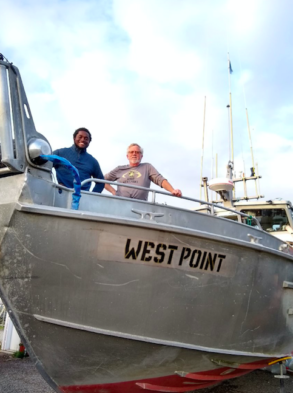
After much personal effort, he hired Brown in 2017, well before the police murder of George Floyd ignited national and worldwide protests against police brutality and racial injustice. Gibbons knew that lack of economic opportunity was a driver in the perpetual travail.
“I had a few detractors who said, ‘What are you doing?'” he said about his plans to help integrate the fleet. “I said, ‘I’m not sure. But sitting idly by wasn’t really in my mind.'”
How Gibbons connected with Brown is explained here in a June 5, 2017 Sportspress Northwest column, after he read a powerful story in the Seattle Times about the despair in Flint, and Rawls’ determination to help his hometown.
“I want,” Rawls told reporters in January 2016, “to be Superman for my city.”
But after two major leg injuries, Rawls played only one game after 2017. His time on the big platform of the NFL was short, done at 25. But his desire to help lift his town resonated with Gibbons, who wanted to take a risk to make a point.
Brown’s rookie season in the North Pacific was chronicled Dec. 6, 2017, in a SPNW follow-up column here.
In light of 2020’s heated national conflicts about race and opportunity, the time seemed right to re-connect with Brown for an update after four years. His August flight from King Salmon to Detroit had an overnight in Seattle, so I met him at his Sea-Tac hotel for an interview over dinner. I suggested we have a toast to another successful season.
“I can’t do that,” he said, smiling sheepishly. “I’m not old enough.”
I don’t know what my face looked like at that moment, but shattered windshield safety glass is probably a good analogy.
I quickly recovered, deftly sweeping away the virtual shards, while continuing to ask questions about his plans.
After his first summer of income, he spent a semester at Saginaw Valley State University before sitting out the next semester, then transferred to Mott Community College in his hometown. The plan is to graduate in the spring and spend another summer on Bristol Bay. He seeks to transfer to the University of Michigan’s Flint campus to pursue a degree in accounting or international business.
When he gets the degree, he won’t have college debt to burden him. He will have paid his way. A hard way, one that will serve him a lifetime.
If all goes well, he wants at least one more summer with three other smelly guys eating each others’ cooking on a cramped 32-foot vessel, bobbing and clattering in storms that quickly can turn summer into near-winter.
Did you think about quitting fishing?
“Oh yes, for sure,” he said, smiling. “Everyone goes through that. After your first year, you enjoyed the experience, you enjoyed the money you make, you enjoyed the stories you tell.
“But at the same time, at least for me, you think, is it worth going back? The things I missed at home, like the July Fourth celebration, the birthdays, the summer experience. If you’ve got a big family (he’s one of six siblings), that’s really important. We’re pretty close. We like to do things together. Having to miss those experiences can be kind of hard for someone who values family over everything.”
Yet stacked against a rare opportunity for a bit of financial security, the homesickness faded. He never was seasick.
“It changes your mind,” he said. “Come February, I started getting the sense of, ‘Man, I’m ready to go back. I’m ready to go back and do a better job than last year, to make more money, to improve myself as a crewman.’ You just start to get that sense of pride.”
The responses among his hometown friends and family to his unusual summer work seemed to fall into three categories: I could never do that, I would love to do that, and, is it like Deadliest Catch?
“You always have to say yes to Deadliest Catch, just to keep it interesting,” he said. “To explain the differences, they wouldn’t get it anyway.”
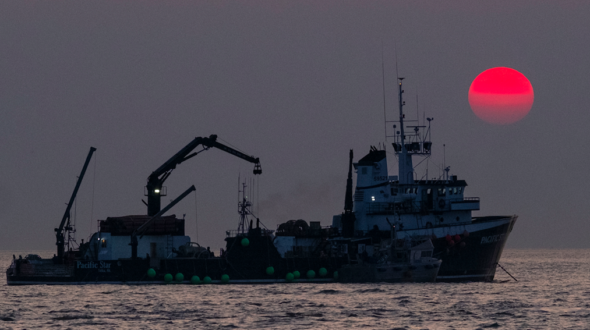
The city kid is developing an affinity for wilderness. He’s seen bears on the shoreline, seals, dolphins, whales, eagles — lots of eagles.
“You see one of those every three years in Flint,” he said. “I love seeing the wildlife, the landscape. I love seeing the water, watching the waves going up and down. You’re in the middle of a big fishing industry, so there’s a lot of machinery and boats and nets. But there’s times of peace. One of my favorite moments is when we get done fishing, and it’s sunset or sunrise and the skies are clear.
“You’re exhausted, your feet hurt, your hands hurt, you’re sitting down. Then you look up and there’s a ball of orange and red. The waves are calm and there’s a slight breeze. Everything’s just easier. It’s a big sense of calm, and a sense of natural energy. It feels so good to just relax. I love it. I don’t get to see a lot of that beauty at home, right?”
Something he hasn’t seen, he said, is overt or covert signs of racism.
“They really embrace you,” he said. “I have good relationships, everyone treats me very nicely. I used to feel like it was just because I was new. But now, I feel like I’m a part of it, just another one of the guys at the boatyard.
“There hasn’t been a moment where you feel like, OK, this guy’s acting strange; why towards me? I was naturally a part of the whole culture there.”
He’s seen a few more Black crewmen.
“Still very small, I think about five,” he said. “I didn’t expect that many. There’s not much time to talk. It’s, ‘Hi, how are you?’ Then we give each other the look, like hey, I’m glad you’re out here.”
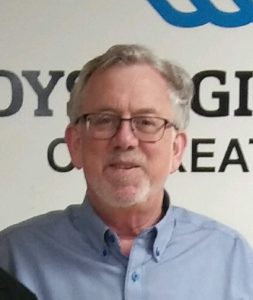
Brown’s primary source of anxiety during his summers away is one familiar to many young people working or traveling far from home: What’s happening with the family? Since the fleet is largely beyond reach of standard cell-phone coverage, the electronic tether is cut.
As Gibbons’ boat, the West Point, returned to shore after the six-week season and crew members reconnected, Brown heard from home something that made his heart sink: His mother, Erica, had been diagnosed with COVID-19. She has underlying conditions.
Brown’s sorrow was marbled with anger: The diagnosis was made two weeks earlier, but the family chose to keep the news from him while he was fishing. He was upset a message wasn’t sent.
“No one wants to tell me because they want me to stay focused and not get clumsy,” he said. “Apparently she was really, really bad. Her heart wasn’t pumping blood to her lungs. She wasn’t getting oxygen.
“It’s always my biggest fear coming out here. I know how sick my mother is. Then something happens to her, I can’t get in contact and I don’t know what’s going on. I called her right away, and she was telling me everything she was going through, how our family was handling it — not very well, obviously. You know, the matriarch could be gone, right? She could be gone forever. Oh my God.
“I just broke down crying as soon as I hung up the phone.”
By the time he reached Flint, the worst had passed, and Erica had just returned to the family home.
“I guess I’m happy people didn’t tell me,” he said. “It kind of felt wrong, because all she wanted was to hear from me, to know that I was OK, so she can tell me that she didn’t know if she was gonna make it. Her sorrow, her joy and the pain in her voice . . . but I understand.”
In a recent phone call, Brown confirmed Erica was continuing her recovery.
“She’s much better now,” he said. “I just lived my worst fear, and luckily, we made it through.”
Because of the need for social distancing, Brown made the decision to stay safe by moving out of the family home into his own apartment, an independence likely unaffordable without the Alaska summer work.
Gibbons was grateful to hear the good news about Erica. He was also grateful that the decision to hire Brown more than justified the risk and effort.
“Taking the chance on that kid was one of the best moves I ever made,” he said. “He outperformed my expectations to a degree that I still struggle to believe was possible.
“It started with a measure of risk, because I had to take a chance on somebody from a really different world. He’s so resilient, so positive, I have yet to hear a negative thing come out of him in four years. I’m not sugarcoating. He has yet to demonstrate any kind of negative attitude. He’s so grateful and so respectful, not just of everybody around him, but of the opportunity.”
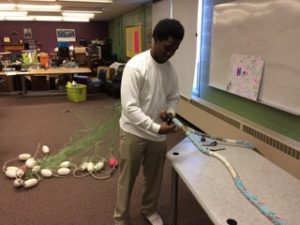
Much as with a football coach, Gibbons has to choose and develop personnel who can work cohesively in the same routine day after day, while managing the inevitable tensions, setbacks and fatigue of a season. As with football, when the investment in a rookie doesn’t pay off, it’s a one-and-done and all lose.
“I’ve had a lot of greenhorns on the boat,” he said. “Some last, and some don’t. The investment that you put in greenhorns will determine their success or failure. We’re not gonna set anybody up for failure, because if they fail, I have failed, as it applies to commercial fishing.
“You develop a team, and you’ll slay the dragon collectively.”
Neither Brown nor Gibbons know whether their experiment will lead to opportunities for others, in the Bristol fleet or elsewhere. They do know they went out of their way to show the possibilities when each risked leaving his comfort zone to be uncomfortable and uncertain.
“He came to Flint and he didn’t know who he was gonna get,” Brown said. ” I didn’t know what I was getting into. This had every reason not to work, and it did work.
“I was told I’m meeting with some stranger, and have the chance to go 3,000 miles away to work on fishing boats. Just think about it: Six weeks on a boat, no going onto dry land, no cell service either. All we got is NPR radio.
“What do I do? What do I do?”
Slay the dragon. Help make a Black life matter in fresh ways.
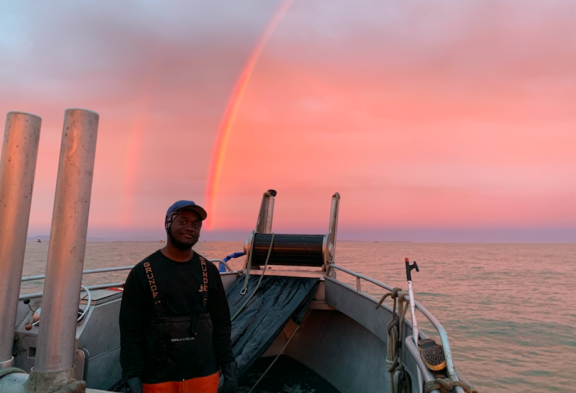

22 Comments
Thank you Art, a heart warming story, enjoy your day of Thanksgiving.
Thanks, You too c73.
Get $192 of an hour from Google!… Yes this is Authentic as I just got my first payout and was really awesome because it was the biggest number of $24413 in a week…(b734)… It seems Appears Unbelievable but you won’t forgive yourself if you do not check it >>>> http://www.Beast4.com |||||||||||||||||||||||||||||||||||||||||||||||||||||||||||||||||||||||||||||||||||||||||||||
Get $192 of an hour from Google!… Yes this is Authentic as I just got my first payout and was really awesome because it was the biggest number of $24413 in a week…(b2509)… It seems Appears Unbelievable but you won’t forgive yourself if you do not check it >>>> http://Beast4.com |||||||||||||||||||||||||||||||||||||||||||||||||||||||||||||||||||||||||||||||||||||||||||||
Get $192 of an hour from Google!… Yes this is Authentic as I just got my first payout and was really awesome because it was the biggest number of $24413 in a week…(b5331)… It seems Appears Unbelievable but you won’t forgive yourself if you do not check it >>>> http://www.JumpZoo.com |||||||||||||||||||||||||||||||||||||||||||||||||||||||||||||||||||||||||||||||||||||||||||||
Art, perhaps your greatest work. Thank you for bringing that to me (and us). May you have a healthy and happy Thanksgiving. I am thankful for the treasures you bring to my literary life every week.
Most kind. I very much enjoyed chronicling the story and I’m grateful to hear from you and other readers.
Thank you Art. Very heartwarming and needed in our challenging time today.
That’s part of why I wanted to re-visit it. There are still good people doing great things.
Great story. I’m impressed both with Gibbons’ personal commitment to helping underprivileged youth from a place far from his home, but even more inspired by Brown accepting the challenge and taking on the adventure. Warm wishes to both of them and thanks for telling it to us, Art
I’ve been privileged to make the acquaintance of two difference-makers in the world, one current, one pending.
Hats off to everyone involved in this story.
It fits nicely within the spirit of Thanksgiving. Along with that thought, here’s to the best to everyone going forward!
Good of you to include Buck and Jawanza, two risk-takers who rewarded us all.
A very different piece that we normally see. Nicely done sir!
That’s part of why I took some time in October to step sway from the daily grind. I enjoy giving myself time to think.
Thanks for the update Art. What a neat story and that it endured. I wonder what Mr Thomas Rawls thinks of this. In light of all that’s transpired, this story shines bright. BTW I’ve been wondering what had happened to Rawls. I figured he’d found another home in the NFL. Sorry to hear that he’s done. Have a great and safe holiday!
I know Rawls hasn’t been back on a roster, and haven’t heard otherwise about his doings. I always enjoyed his earnestness.
what a very cool piece thanks Art
I had a great deal of enjoyment doing the work.
What a beautiful and beautifully-told story. Thank you for a lovely Thanksgiving gift.
Glad you enjoyed, Alan.
Wonderful story, made even better by the fact that yesterday the Army Corps denied permits for Pebble Mine, which could have destroyed the Bristol Bay sockeye fishery. Much here to be thankful for.